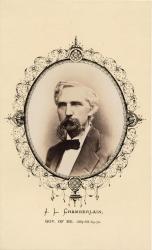
Society of the Cincinnati Medal, ca. 1784
The General Henry Knox Museum
In Uniform
The experiences of individual soldiers, men and women, in wars from earliest European settlement to the 21st century offer a compelling picture of what war is like. There are heroes and heroines, and those soldiers no one hears much about.
The meaning of their service to the soldiers themselves can be seen in the organizations they form on their return – the Society of Cincinnati for Revolutionary War officers, the Grand Army of the Republic for Civil War veterans, the Veterans of Foreign Wars for those who served in the Spanish-American War and in the Philippine insurrection, the American Legion following World War I, and numerous others.
Despite some similarities for all soldiers, war service means different things to different veterans. For instance, London Atus, the black slave of James Lyon, a minister in Machias served several short-term enlistments during the Revolution. Listed as London Lyon in Massachusetts Soldiers and Sailors in the War of the Revolution, Atus served from 13 days to 11 months in various capacities including artillery private, seaman, and general messenger.
He used his wages to purchase his freedom from Lyon, unknowingly just before Massachusetts eliminated slavery throughout the state and the district of Maine.
Some men who went off to the Civil War were fighting to preserve the union; some probably were opposed to slavery. Others, most likely, were caught up in the patriotic moment.

George H. Libby and Jesse B. Allen, 1861
Maine Historical Society
Unlike its experience in earlier conflicts, Maine's participation in the Civil War was almost exclusively from a distance by way of enlistments, supplies, private charities, and related volunteer efforts. The state itself was never seriously at risk, but that did not remove the emotional nature of the war or the immediacy of its effects for the soldiers who fought in Maine's 40-some regiments.
Maine was unusual in successfully recruiting its quota of volunteers for the army. Still it, along with other states, eventually offered state and town bonuses, thus adding economic inducements to patriotic ones.
John West Haley of Biddeford and Saco fought with the 17th Maine Regiment and kept a diary of his wartime experiences. He toted up the various bonuses ($140), praised the "men of means" who spawned such generosity, and concluded "it is touching to see the number of persons who are ready, even anxious, to sacrifice their relatives on the altar of their country. … Such high appreciation is almost enough to die for."
Haley fought at Fredericksburg, Gettysburg, Spotsylvania, and Cold Harbor, each among the war's most grueling campaigns. He was among the scant 20 percent of his regiment who survived the war, and walked back from Virginia to his home in Saco at war's end.

Joshua L. Chamberlain, ca. 1867
Maine Historical Society
In addition to his diary, Haley kept a roster of his company with entries such as "Loved rum more than country," "Always had a spasm of virtue when under fire," "Tough as a boiled owl," and "Had an uncommonly brave appetite." Of himself he said only "Below criticism. Poor fighter. Attained successful mediocrity as a soldier. Present all the time." Amongst the names, poignantly listed, are several sets of brothers.
The 20th Maine Regiment, serving under Gen. Joshua L. Chamberlain, a professor at Bowdoin College who was trained in theology, was one of several Maine regiments that achieved great success – and fame – at the Battle of Gettysburg.
The 20th Maine held the battle section known as Little Round Top during those three brutal days in July 1863. Having exhausted themselves and their ammunition, Chamberlain's men nonetheless successfully charged the Confederate troops at bayonet point, forced their surrender and turned the tide of combat.
The 20th Maine, like some other regiments, held reunions after the war, including at Gettysburg.

Naval Air Station Operations Office, Brunswick, ca. 1945
Pejepscot History Center
By World War I, some women as well as men were in uniform, although in supporting, non-combat roles as nurses. In World War II, women again served primarily as nurses, although the military added women clerks and women pilots who ferried planes, among other non-combat jobs.
Mainers have fought in many wars since the Civil War – the Spanish-American, World War I, World War II, Korea, Vietnam, the two Gulf Wars, and Afghanistan, among others.
In all cases, those on the frontlines have the most direct experience of war, but the impact of their experiences and their service reach far into families and communities.








